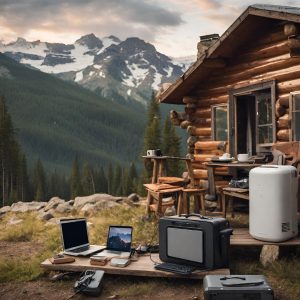Jackery Family Off-Grid: Backup Power for Living Off the Grid

Living off the grid can be a rewarding experience, but it also comes with its own set of challenges. One of the most critical challenges is ensuring a reliable backup power supply. You can have peace of mind knowing that you have a sustainable source of power to keep your home running smoothly because you have backup power for your family living off the grid.
Understanding Off-Grid Power Systems is the first step to selecting the right Jackery Solar Generator for your needs. Jackery Solar Generators are portable solar systems that combine Jackery Solar Panels and Portable Power Stations to maximize the use of solar energy for off-grid living. With a Jackery Solar Generator, you can power everything from your lights and appliances to your electronics and tools.
Integrating Backup Power into Your Off-Grid Home is a crucial aspect of sustainable living. It not only ensures that you have a reliable source of power but also helps you reduce your carbon footprint. You can enjoy the benefits of off-grid living while minimizing your impact on the environment.
Key Takeaways
- Understanding Off-Grid Power Systems is essential for selecting the right Jackery Solar Generator for your needs.
- Integrating Backup Power into Your Off-Grid Home is crucial for sustainable living.
- Jackery power for your family off-grid provides a reliable and sustainable source of power for your off-grid home.
Understanding Grid Power Systems
Living off the grid requires a reliable source of power that is independent of the electrical grid. An off-grid power system is a self-contained electrical system that generates and stores its own power. The three main components of an off-grid power system are solar panels, a power station, and an inverter. Here's what you need to know about each component:
Components of a Solar Power System
Solar panels are the primary source of energy for an off-grid power system. They convert sunlight into electricity that can be used to power your home. The size and number of solar panels you need will depend on your power needs and the amount of sunlight your location receives. It is important to choose high-quality solar panels that are durable and efficient.
The power station is the heart of your off-grid power system. It stores the energy generated by your solar panels and distributes it to your home as needed. The capacity of your power station will depend on your power needs and the size of your solar panel array. It is important to choose a power station with a reliable battery capacity that can provide enough power to meet your needs.
The inverter is the device that converts the DC power generated by your solar panels into AC power that can be used to power your home. It is important to choose an inverter that is compatible with your power station and solar panel array.
Determining Power Needs for Off-Grid Living
Determining your power needs is an important step in designing your off-grid power system. You will need to calculate the amount of power you need to run your appliances and electronics. You can use an online calculator to help you determine your power needs.
It is important to choose energy sources that are reliable and efficient. Solar power is a popular choice for off-grid living because it is a renewable and sustainable source of energy. Other energy sources, such as wind and micro-hydro, can also be used to supplement your solar power system.
Understanding the components of a solar power system and determining your power needs are important steps in designing an off-grid power system for your family. With the right equipment and energy sources, you can enjoy the freedom and independence of living off the grid.
Selecting the Right Jackery Solar Generator
When it comes to living off the grid, having a reliable backup power source is crucial. That's where Jackery solar generators come in. But with different models and features, selecting the right one can be overwhelming. Here's a breakdown of what you need to know to select the right Jackery solar generator for your family's off-grid needs.
Jackery Solar Generator 2000 Pro Features
The Jackery Solar Generator 2000 Pro is a popular choice for families living off the grid. It has a 2000-watt capacity and can power small appliances, electronics, and even some power tools. It's also lightweight and portable, making it easy to move around your property.
The generator features a Lithium-ion battery, which is known for its high energy density and long lifespan. It also has a built-in MPPT controller, which optimizes charging efficiency and ensures your devices are charged quickly and safely.
Comparing Jackery Solar Generator 3000 Pro and 1500 Pro
If you need more power, the Jackery Solar Generator 3000 Pro and 1500 Pro are worth considering. The 3000 Pro has a 3000-watt capacity, while the 1500 has a 1488-watt capacity. Both models feature a LiFePO4 battery, which is known for its safety, stability, and long lifespan.
The main difference between the two models is their size and weight. The 3000 Pro is larger and heavier, making it less portable than the 1500. However, it does have more outlets and can power larger appliances and tools.
Assessing Battery Types and Capacity
When selecting a Jackery solar generator, it's important to consider the battery type and capacity. Lithium-ion batteries are lightweight and have a high energy density, making them a popular choice for portable generators. LiFePO4 batteries, on the other hand, are heavier but more stable and have a longer lifespan.
Battery capacity is measured in watt-hours (Wh) and determines how long the generator can power your devices. The higher the watt-hour capacity, the longer the generator will last. It's important to consider your family's power needs and how long you'll need the generator to run when selecting a model.
Selecting the right Jackery solar generator for your family's off-grid needs involves considering the generator's capacity, battery type, and battery capacity. The Jackery Solar Generator 2000 Pro is a popular choice for smaller power needs, while the Jackery Solar Generator 3000 Pro is better for larger power needs. No matter which model you choose, having a reliable backup power source is essential for off-grid living.
Integrating Backup Power into Your Off-Grid Home
Living off the grid requires you to have a reliable backup power system in place. In this section, we will discuss how to integrate backup power into your off-grid home. We will cover installation and safety considerations, managing power supply and consumption, and maintaining and expanding your system.
Installation and Safety Considerations
Before installing a backup power system, you need to consider safety measures. You should hire a professional electrician to install the system to avoid any electrical hazards. Ensure that the system is installed away from flammable materials and that it is properly grounded.
When selecting appliances for your off-grid home, choose those that are energy-efficient and have low power consumption. This will help you reduce energy consumption and prolong battery life.
Managing Power Supply and Consumption
Managing power supply and consumption is crucial when living off the grid. You need to ensure that your power supply is sufficient for your needs. You can achieve this by monitoring your energy usage and optimizing your power system.
To manage power consumption, you can use a power monitor to track your energy usage. This will help you identify areas where you can reduce energy consumption. You can also use energy-efficient appliances and lighting to reduce energy usage.
Maintaining and Expanding Your System
Maintaining and expanding your backup power system is essential to ensure that it is always functional. Regular maintenance will help you identify any issues before they become major problems. You should perform routine checks on your batteries, solar panels, and other components of the system.
To expand your system, you can add more solar panels or batteries to increase your power supply. You can also invest in a generator for backup power during extended power outages.
Integrating a backup power system into your off-grid home requires careful planning and consideration. By following the safety guidelines, managing power supply and consumption, and maintaining and expanding your system, you can ensure that your off-grid home is always powered.
Lifestyle Benefits and Challenges of Off-Grid Living
Living off-grid can be a challenging yet rewarding experience. It requires a significant shift in lifestyle, but it also provides many benefits that make it worthwhile. Here are some of the lifestyle benefits and challenges of living off-grid.
Achieving Self-Sufficiency with Jackery Products
One of the main benefits of living off-grid is achieving self-sufficiency. Jackery offers a range of products that can help you achieve this goal. Their portable power stations are perfect for powering your off-grid cabin or home. With a Jackery power station, you can generate your own electricity and reduce your reliance on the grid. You can also use their solar panels to charge your power station, making it a sustainable and environmentally-friendly option.
Environmental Impact and Sustainability
Living off-grid has a positive impact on the environment. By generating your own electricity and reducing your reliance on the grid, you are reducing your carbon footprint. You can also adopt sustainable practices such as composting, rainwater harvesting, and growing your own food. These practices not only reduce your impact on the environment but also promote self-sufficiency.
However, living off-grid also comes with its challenges. One of the main challenges is the lack of access to public utilities such as water and electricity. This means that you need to generate your own power and find alternative sources of water. It also requires a significant investment in equipment and infrastructure.
Another challenge is the need to adopt a self-sufficient lifestyle. This requires learning new skills such as gardening, carpentry, and plumbing. It also requires a significant amount of time and effort to maintain your off-grid lifestyle.
In conclusion, living off-grid can be a challenging yet rewarding experience. With the right equipment and mindset, you can achieve self-sufficiency and reduce your impact on the environment. Jackery products can help you achieve this goal by providing you with a reliable source of power.
Frequently Asked Questions
What are the essential components of a living off-grid starter kit?
If you are planning to live off-grid, there are a few essential components that you will need to get started. These include a reliable power source, such as a solar generator like Jackery, a water source, a way to dispose of waste, and a shelter. You may also want to consider investing in a composting toilet, a wood stove for heating, and a garden for growing your own food.
Can a solar generator like Jackery provide enough power for a whole house?
While a solar generator like Jackery can provide enough power for small appliances and electronics, it may not be enough to power an entire house. If you are planning to live off-grid and need more power, you may want to consider investing in a larger solar system or a backup generator.
What are the best strategies for living off the grid with limited financial resources?
Living off the grid with limited financial resources can be challenging, but it is possible. Some strategies to consider include building your own shelter, growing your own food, using alternative energy sources like solar or wind power, and reducing your overall consumption.
How many watts are typically required to power an off-grid cabin?
The amount of power required to power an off-grid cabin will depend on a variety of factors, including the size of the cabin, the number of appliances and electronics you plan to use, and your overall energy consumption. As a general rule, you will need at least 1,000 watts of power to run basic appliances like a refrigerator, lights, and a computer.
How long can a Jackery 1000 sustain a refrigerator or similar appliances?
A Jackery 1000 can sustain a refrigerator or similar appliances for up to 14 hours, depending on the size and efficiency of the appliance. It is important to note that the actual runtime will vary depending on a variety of factors, including the temperature of the environment, the size of the appliance, and the overall energy consumption.
Is it feasible to live off-grid in an urban environment, and what would be needed?
Living off-grid in an urban environment can be challenging, but it is possible. Some key considerations include finding a suitable location for your off-grid setup, investing in alternative energy sources like solar or wind power, and reducing your overall energy consumption. You may also want to consider investing in a composting toilet, rainwater harvesting system, and a garden for growing your own food.
Related articles for RV and Off Grid Living Solutions
Jackery for Off Grid Cabin
Jackery Campervan Features
Jackery for RV Appliances
Charging RV Mobility Scooters
1000 Pro for Off-Grid Events
Jackery Off-Grid Solar
Silent Off-Grid Jackery
Major Off-Grid Appliances
Calculate Off-Grid Runtimes



